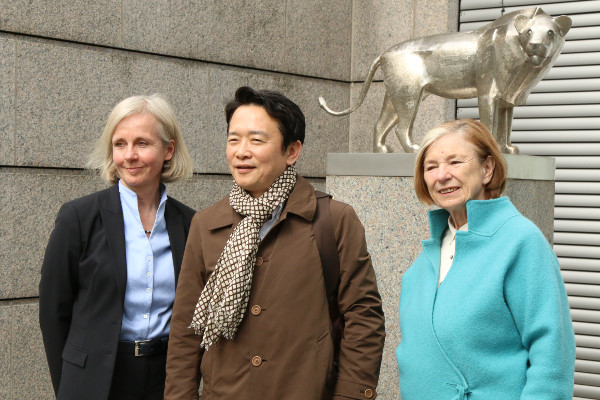Ursula Männle Receives Governor Kyung-Pil Nam
Governor Nam Kyung-Pil of Gyeonggi province (middle) together with Prof. Ursula Männle, president of Hanns Seidel Foundation (right), in front of the Bavarian Lion
Gyeonggi province is an important business location in South Korea. For a couple of years Bavaria and Gyeonggi have been in close dialogue with each other to maintain good economic relations. In this connection, the governor of Gyeonggi province Kyung-Pil Nam and the Bavarian Minister for Economic Affairs Ilse Aigner signed a Memorandum of Understanding strengthening the economic relations and information exchange of the two partners. For Bavaria South Korea is one of the most important trading partners in Asia.
Apart from economic relations a desire for exchange of experiences with Bavaria persists, as it used to be part of the border area to the GDR. The HSF Korea supports this wish of Gyeonggi province that borders on North Korea and is has maintained contact with Governor Kyung-Pil Nam for some time.
In South Korea the social liberal or the conservative party traditionally dominate. Hence, a coalition between parties in order to form a government has not been necessary neither on province nor on national level. However, after the election of the 20th National Assembly on April 13th 2016 change is apparent.
In light of this current shift, Prof. Männle, Prof. Münch, and Governor Nam discussed causes for coalitions as well as political advantages and disadvantages.
Discussants stated that mutual respect and the ability to compromise was indispensable for democratic parties. In Germany, too, the party structure had been subject to significant change since the foundation of the Federal Republic.
They stated that the federal system had been essential for reflecting also East German interests and hence had helped the social merger of the two Germanys after reunification. Nowadays, the parties of Germany and South Korea had to deal with social problems such as the distribution of wealth, an ageing population, and unemployment. The formation of coalitions may be an opportunity for Korea, too, to reflect the diversity of opinions in a modern society and to do it justice.

